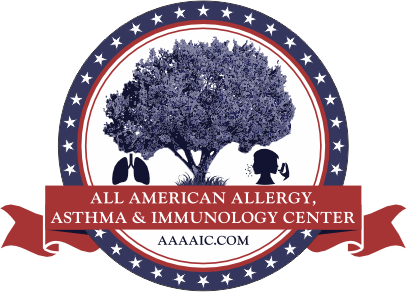Over 17 million people in the United States have been diagnosed with asthma. And about half of those people have some kind of allergy. The reaction that causes asthma is exceptionally similar to the reaction that causes allergies. While there are many similarities between allergies and asthma, there are also numerous differences.
Allergies or Asthma: Identifying the Difference
Allergies and asthma are both characterized by reactions to substances like dust, pollen, and dander. The primary difference is the location of the reaction. Allergic reactions to dust, pollen, and dander occur in the nose, while asthma is a reaction that happens in the lungs. Asthma is characterized by coughing, wheezing, and shortness of breath. Allergies can sometimes leave patients with a cough, as well, but it’s generally less severe than a cough with asthma. Symptoms of allergies are generally a runny nose, itchy eyes, and watery eyes. But asthma symptoms can be more severe and even life-threatening.
So far, we’re not sure why some people have allergies and why some have asthma. It’s theorized that the answer lies in a person’s genetics. Some patients, like those who have hay fever, are at risk for developing asthma. There are too many similarities to list. But what are the different types of allergies?
- Hives: Hives are characterized by a rash of red welts on the skin when exposed to allergens.
- Dermatitis: General inflammation of the skin when exposed to an allergen.
- Eczema: Eczema happens when the skin is rough and inflamed, with blisters that cause itching and bleeding, sometimes resulting from a reaction to irritation.
- Hay fever: Hay Fever is caused by pollen or dust in which the mucous membranes of the eyes and nose are itchy and inflamed, causing a runny nose and watery eyes.
- Conjunctivitis: Inflammation of the eyes.
Whether you have asthma or allergies, it’s vital to understand what triggers the reactions that you have. Pollen, dust, and pet dander can cause reactions in people who have allergies or asthma, and the triggers often change with the seasons.
Allergies are often treated with allergy shots. The shots gradually lessen your immune system’s response to allergic triggers. Allergy shots also work by using immunotherapy treatments which introduce a small number of allergens into your body over time. By doing this, your body can learn how to fight the allergens and lessen your symptoms.
Asthma is treated with specialized medications administered with an inhaler. The inhaler brings the medication directly to the lungs, where the reactions take place. Inhalers are helpful because they work quickly and can reverse asthma attacks.
Reach Out for Treatment For Asthma or Allergies
Over time, allergies and asthma can change. Either condition can worsen, improve, or disappear. With the help of medications and treatments, both conditions can be easier to live with. And with the proper medication, your condition can go away entirely. If left untreated, allergies and asthma can have severe consequences. Reaching out to All American Allergy so we can help you determine what treatment is best for you.


